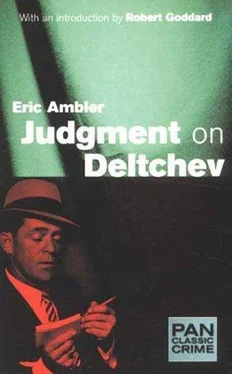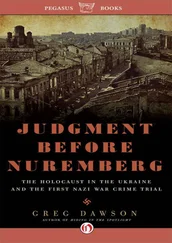Eric Ambler - Judgment on Deltchev
Здесь есть возможность читать онлайн «Eric Ambler - Judgment on Deltchev» весь текст электронной книги совершенно бесплатно (целиком полную версию без сокращений). В некоторых случаях можно слушать аудио, скачать через торрент в формате fb2 и присутствует краткое содержание. Год выпуска: 1977, ISBN: 1977, Издательство: Vintage, Жанр: Криминальный детектив, на английском языке. Описание произведения, (предисловие) а так же отзывы посетителей доступны на портале библиотеки ЛибКат.
- Название:Judgment on Deltchev
- Автор:
- Издательство:Vintage
- Жанр:
- Год:1977
- ISBN:9780307049971
- Рейтинг книги:4 / 5. Голосов: 1
-
Избранное:Добавить в избранное
- Отзывы:
-
Ваша оценка:
- 80
- 1
- 2
- 3
- 4
- 5
Judgment on Deltchev: краткое содержание, описание и аннотация
Предлагаем к чтению аннотацию, описание, краткое содержание или предисловие (зависит от того, что написал сам автор книги «Judgment on Deltchev»). Если вы не нашли необходимую информацию о книге — напишите в комментариях, мы постараемся отыскать её.
Judgment on Deltchev — читать онлайн бесплатно полную книгу (весь текст) целиком
Ниже представлен текст книги, разбитый по страницам. Система сохранения места последней прочитанной страницы, позволяет с удобством читать онлайн бесплатно книгу «Judgment on Deltchev», без необходимости каждый раз заново искать на чём Вы остановились. Поставьте закладку, и сможете в любой момент перейти на страницу, на которой закончили чтение.
Интервал:
Закладка:
I shook my head. ‘When did you send that cable?’
‘Four days ago, Mr Foster.’
‘Why not before?’
‘It was not certain that you were coming.’
‘It was settled three weeks ago that I was coming.’
‘I did not know that.’
‘Have you had a reply?’
‘Yes, Mr Foster.’
‘May I see it, please?’
‘Certainly.’ He opened a drawer in the desk and brought out a cable and put it in front of me. I read:
Your 109 of 6 June understood advise Foster and arrange air passage London soonest close trial .
‘You could have shown me this before,’ I said.
‘I did not realize that you did not trust me, Mr Foster,’ he replied gently. ‘The cable only says to advise you of something and secure an air passage for you. It does not explain what I have been telling you. You still have to believe that I am telling you the truth.’
His smile said that this was the moment when I should feel silly and apologize. Perhaps it was the smile that prevented my doing so. Instead, I said, ‘I take it that the other foreign correspondents will be under the same restriction?’
‘If they are hostile to the regime they will have to be equally discreet.’
‘That story about the American who tried to go to Greece for the weekend — I suppose you made that up in case I thought of the idea myself and didn’t tell you.’
‘It was a way of warning you that the method was known.’
‘You go at things in rather a roundabout way, don’t you?’
He looked at me thoughtfully. ‘One gets in the habit of it, Mr Foster,’ he said, and then paused. ‘Roundabout ways are sometimes safer. However’ — his expression changed and he stood up expansively, his smell billowing around him — ‘it is good to meet a person who cares for frankness. We can understand one another.’ He smiled cheerfully. ‘We shall get on well, Mr Foster. We can help each other, and that is as it should be. I will show you.’
He went over to a filing cabinet in the outer darkness, opened one of the drawers, and began to search through it.
‘You know, Mr Foster,’ he murmured as he picked through the files, ‘being expelled from a country is not dignified and not at all rewarding. For a few hours you are the brave man who dared to tell the truth. But the next day, when the handclasp of friends is forgotten, you are just another reporter without a job.’
He came back to the desk with an untidy bundle of papers and a large envelope.
‘When did it happen to you?’ I asked.
‘Italy, 1930. I was a married man then, too,’ he said. He hesitated for an instant, then stuffed the papers into the envelope and handed it to me with the rueful smile of a rich uncle for the rascally nephew whom he likes.
‘The office file on Yordan Deltchev, Mr Foster. It will help you.’
‘Thank you.’
‘Please.’ He put up a protesting hand. ‘I want to help you, Mr Foster. And I want you to know that I want to. And that is frank. Avanti! Now we go to dinner, eh?’
That night I was too tired to sleep. For a while I tried to do so; then I gave up, switched on the light, and began to read the file Pashik had given to me.
At that point I still had the illusion that I could report the Deltchev trial.
CHAPTER THREE
This is what I learned from the file.
Until the spring of 1940, when his country had joined two of its Balkan neighbours in coming to terms with the Axis, Yordan Deltchev, although an important figure in the councils of the Agrarian Socialist Party, had had no popular following. Originally a lawyer by profession, he had been deputy for a provincial manufacturing area and then, having served the monarchy and later the Republic in various subordinate capacities, had become Minister of Posts and Telegraphs.
At that time he had been regarded by the knowledgeable as a very able man and as either honest or so far insufficiently tempted. That he was not then even considered as potentially a great popular leader is understandable. His special talent was for organization; and while as a speaker he was not without force, the cool logic, dryly delivered, that made him effective in debate seemed unlikely ever to capture the hearts of audiences of peasants. That it did ultimately do so was a phenomenon produced by a peculiar combination of circumstances. Deltchev himself had very little to do with it.
He had been one of the few deputies, and the only minister, who had opposed the alliance with the Axis at all vigorously; and during the summer of 1940, at the request of the German authorities, he had been interned. Towards the end of the year he was released, but kept under police surveillance. Two years passed before the surveillance became sufficiently negligent for him to embark on the underground political activity with which his name was to become associated.
Before that time, opposition to the pro-German Government and its allies had been expressed chiefly by acts of sabotage against war-supply installations and by propaganda against the recruitment of divisions for the Russian front. This work had been done by groups led by militant People’s Party men, but containing a good proportion of Agrarian Socialists. Yet, although it was sometimes spectacular and always dangerous, the amount of inconvenience it caused the enemy was small and its effect on popular morale disappointing. To Deltchev’s way of thinking, the policy of the underground opposition should be to leave the winning of the war to those who could fight effectively and to concentrate on planning for the future of the country during the period immediately following the inevitable German collapse. He saw that her fate at the hands of the victorious powers would depend very much on the speed with which she could herself establish a provisional government sufficiently uncompromised to negotiate without cringing and strong enough to prevent civil war.
The resultant Committee of National Unity was not created by Deltchev alone, but it was he who made it effective. Clandestine organizations are mostly recruited from among the dedicated, the romantic and the mentally ill-adjusted men and women of a community; and in them courage and devotion are more easily found than high-level planning ability and political skills. Because he was the clearest thinker the Committee had and the only member of it with any practical experience of government, Deltchev became in effect (though in fact he never held any specific appointment) its President, its Secretary General and, eventually, its spokesman. Hundreds of thousands of people who had never heard of Deltchev the Minister of Posts and Telegraphs now came to know of, and exult in, Yordan Deltchev the patriot. And when the time came for him to speak to them, the dry steady voice and the cool logic seemed, after the hysterical oratory of the war years, to derive from a special kind of sanity and goodness. They felt that he possessed the truth.
If the Provisional Goverment of National Unity set up by the Committee in the spring of 1944 had done no more than sue for peace so promptly, it would have justified its existence; for by this action it saved all but one of the Northern frontier provinces from devastation and kept the minute army intact and available for police duties. Yet it did do more. It was able to secure recognition, qualified but sufficient, by the United Nations, and contrived, in those days of hasty negotiation and shifting authority, to confuse and postpone discussions of such matters as territorial claims and the dismantling of industrial installations. It ensured, at a minimum cost both to the national economy and to the national pride, that most of the vital decisions affecting the country’s future were made not in the heat of the newly won battle, but in the milder atmosphere of delayed peace conferences. The credit for these benefits was given to Deltchev. He began to be nicknamed, affectionately, ‘Papa’ Deltchev.
Читать дальшеИнтервал:
Закладка:
Похожие книги на «Judgment on Deltchev»
Представляем Вашему вниманию похожие книги на «Judgment on Deltchev» списком для выбора. Мы отобрали схожую по названию и смыслу литературу в надежде предоставить читателям больше вариантов отыскать новые, интересные, ещё непрочитанные произведения.
Обсуждение, отзывы о книге «Judgment on Deltchev» и просто собственные мнения читателей. Оставьте ваши комментарии, напишите, что Вы думаете о произведении, его смысле или главных героях. Укажите что конкретно понравилось, а что нет, и почему Вы так считаете.












